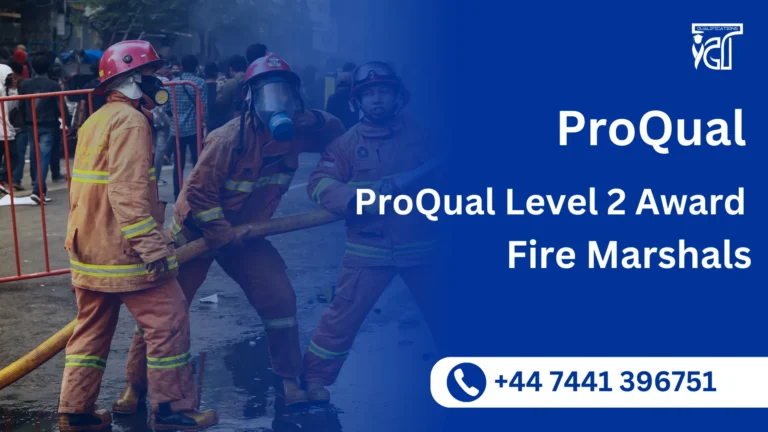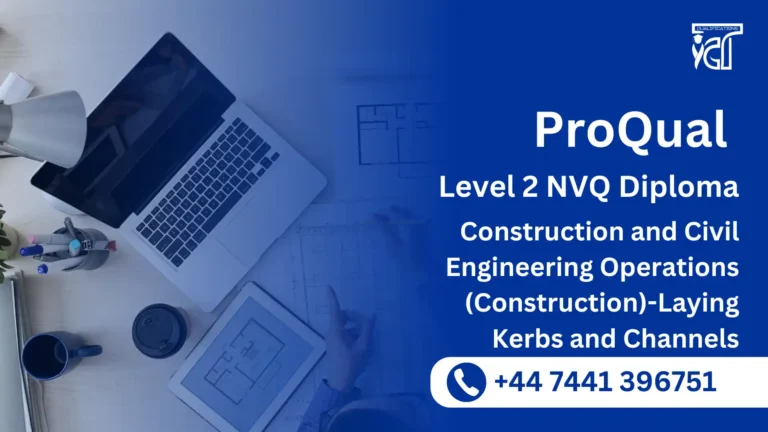The ProQual Level 3 NVQ Diploma in Testing, Inspecting and Thorough Examination Occupations (Construction) – Testing, Inspecting and thorough Examination of Plant, Machinery, Equipment or Accessories is a specialized, Ofqual-regulated qualification designed for experienced professionals working in construction environments where the testing, inspecting, and thorough examination of plant, machinery, equipment, or accessories is a critical responsibility. This nationally recognized diploma provides learners with the practical competencies and technical expertise required to carry out statutory inspections and ensure the safe operation and compliance of construction equipment with industry regulations.
The ProQual Level 3 NVQ Diploma in Testing, Inspecting and Thorough Examination Occupations (Construction) – Testing, Inspecting and thorough Examination of Plant, Machinery, Equipment or Accessories is particularly relevant for those in roles involving plant inspection, lifting equipment checks, health and safety compliance, and mechanical maintenance supervision. It is structured around workplace-based assessment, allowing learners to demonstrate real-world skills without the need for classroom attendance.
Whether you are already working as a plant inspector, equipment examiner, or aspire to move into inspection and testing roles within construction, engineering, or industrial sectors, this NVQ provides a professional pathway to certification, career development, and regulatory compliance.
ProQual Level 3 NVQ Diploma in Testing, Inspecting and Thorough Examination Occupations (Construction) – Testing, Inspecting and thorough Examination of Plant, Machinery, Equipment or Accessories
The ProQual Level 3 NVQ Diploma in Testing, Inspecting and Thorough Examination Occupations (Construction) – Testing, Inspecting and thorough Examination of Plant, Machinery, Equipment or Accessories qualification consists of 6 mandatory units required for completion.
Mandatory Units
GLH (Guided Learning Hours) and TQT (Total Qualification Time) are terms commonly used in vocational qualifications to help define the amount of time a learner is expected to spend on their studies.
| Units: | Title |
| 1 | Confirming work activities and resources for an occupational area in the workplace |
| 2 | Developing and maintaining good occupational working relationships in the workplace |
| 3 | Confirming the occupational method of work in the workplace |
| 4 | Inspecting plant or machinery for operational serviceability in the workplace |
| 5 | Carrying out specific tests on plant or machinery to determine operational serviceability in the workplace |
1. GLH (Guided Learning Hours)
GLH refers to the number of hours a learner spends being directly taught, supervised, or supported during their course. This includes the time spent in activities such as:
- Classroom instruction
- Practical workshops
- One-on-one tutoring or mentoring sessions
- Online learning sessions with tutor support
In other words, GLH represents the time that learners are actively engaged with their instructors or learning activities.
2. TQT (Total Qualification Time)
TQT represents the total amount of time a learner is expected to invest in completing a qualification, including:
- GLH (Guided Learning Hours): Time spent on direct learning, as explained above.
- Self-Directed Learning: This includes time spent on independent study, research, assignment completion, preparation for exams, and any other work the learner does outside of direct teaching hours.
TQT is a broader measure that includes all the time required to achieve the qualification. It helps learners and employers understand the overall commitment required for the qualification.
Key Differences Between GLH and TQT:
- GLH focuses on direct learning with guidance or supervision.
- TQT includes GLH as well as independent study time and other learning-related activities.
Example:
If a qualification has a TQT of 600 hours and a GLH of 250 hours, it means the learner should spend 250 hours in direct learning (classroom, online, or tutor-led sessions) and 350 hours on independent study or research.
Upon completing this Course students will be able to:
Confirming work activities and resources for an occupational work area in the workplace
- Identify work activities, assess required resources and plan the sequence of work.
- Obtain clarification and advice where the resources required are not available.
- Evaluate the work activities and the requirements of any significant external factors against the project requirements.
- Identify work activities which influence each other and make the best use of the resources available.
- Identify changed circumstances that require alterations to the work programme and justify them to decision makers.
Developing and maintaining good occupational working relationships in the workplace
- Develop, maintain and encourage working relationships to promote good will and trust.
- Inform relevant people about work activities in an appropriate level of detail, with the appropriate level of urgency.
- Offer advice and help to relevant people about work activities and encourage questions/requests for clarification and comments.
- Clarify proposals with relevant people and discuss alternative suggestions.
- Resolve differences of opinion in ways that minimise offence and maintain goodwill, trust and respect.
Confirming the occupational method of work in the workplace
- Assess available project data accurately to determine the occupational method of work.
- Obtain additional information from alternative sources in cases where the available project data is insufficient.
- Identify work methods that will make best use of resources and meet project, statutory and contractual requirements.
- Confirm and communicate the selected work method to relevant personnel.
Inspecting plant or machinery for operational serviceability in the workplace
- Interpret the given information relating to the work and resources when inspecting plant or machinery for operational serviceability.
- Know how to comply with relevant legislation and official guidance when inspecting plant or machinery for operational serviceability.
- Maintain safe and healthy working practices when inspecting plant or machinery for operational serviceability.
- Select the required quantity and quality of resources for the methods of work to inspect plant or machinery for operational serviceability.
- Minimise the risk of damage to the work and surrounding area when inspecting plant or machinery for operational serviceability.
- Complete the work within the allocated time when inspecting plant or machinery for operational serviceability.
- Comply with the given contract information to inspect plant or machinery for operational serviceability to the required specification.
Carrying out specific tests on plant or machinery to determine operational serviceability in the workplace
- Interpret the given information relating to the work and resources when carrying out specific tests on plant or machinery to determine operational serviceability
- Know how to comply with relevant legislation and official guidance when carrying out specific tests on plant or machinery to determine operational serviceability.
- Maintain safe and healthy working practices when carrying out specific tests on plant or machinery to determine operational serviceability.
- Select the required quantity and quality of resources for the methods of work to carry out specific tests on plant or machinery to determine operational serviceability.
- Minimise the risk of damage to the work and surrounding area when carrying out specific tests on plant or machinery to determine operational serviceability.
- Complete the work within the allocated time when carrying out specific tests on plant or machinery to determine operational serviceability.
- Comply with the given contract information to carry out specific tests on plant or machinery to determine operational serviceability to the required specification.
Gain an Industry-Recognised Qualification
This diploma provides official recognition of your competence in testing, inspecting, and thoroughly examining plant, machinery, equipment, or accessories within the construction sector. Holding an accredited qualification helps boost your professional credibility and demonstrates compliance with industry standards.
Enhance Your Technical Expertise
Learners develop advanced skills in identifying faults, assessing safety, and ensuring compliance with regulations. This practical knowledge enables you to carry out thorough examinations that maintain operational efficiency, reduce downtime, and promote workplace safety.
Improve Career Opportunities
Completing this qualification can open doors to new roles and responsibilities. Many learners progress into positions such as:
- Plant and Machinery Inspector
- Equipment Testing Specialist
- Quality Assurance Officer
- Construction Site Supervisor
- Health and Safety Compliance Inspector
With demand for skilled inspectors growing across the UK construction industry, this qualification offers excellent career progression prospects.
Pathway to Higher Qualifications
The diploma acts as a stepping stone towards more advanced qualifications, such as:
- ProQual Level 4 Diplomas in Construction Supervision or related areas
- ProQual Level 6 Diplomas in Construction Site Management or Health and Safety
- Leadership and management qualifications for those aiming at senior roles
This progression route allows learners to continue developing both technical and managerial expertise.
Recognition for On-the-Job Skills
Unlike purely academic courses, this NVQ diploma acknowledges the skills you already use in the workplace. Assessment is based on practical performance, making it an ideal route for experienced workers to gain formal certification without the need for classroom-based exams.
Strengthen Workplace Safety and Compliance
By completing this qualification, learners are equipped to play a vital role in protecting workers, maintaining safe construction environments, and ensuring equipment complies with statutory requirements. This benefit not only improves employability but also contributes to safer construction sites across the industry.
The ProQual Level 3 NVQ Diploma in Testing, Inspecting and Thorough Examination Occupations (Construction) is specifically designed for individuals working in, or aiming to work in, roles that require the safe and professional inspection of plant, machinery, equipment, and accessories. It provides formal recognition of workplace skills and ensures competence is aligned with UK construction industry standards.
Ideal Learners for This Qualification
- Construction Professionals
Those already working on construction sites who are responsible for testing, inspecting, and maintaining equipment and plant. - Plant and Machinery Technicians
Individuals handling the operation, inspection, or servicing of heavy machinery and equipment within construction or engineering sectors. - Site Supervisors and Team Leaders
Workers looking to strengthen their technical competence and compliance knowledge to progress into supervisory roles. - Health and Safety Officers
Professionals aiming to expand their expertise in equipment safety, compliance with statutory requirements, and risk prevention. - Quality Control Inspectors
Individuals tasked with ensuring plant, machinery, and equipment meet both industry standards and safety regulations. - Experienced Workers Without Formal Qualifications
Those with practical knowledge gained through experience who wish to gain an industry-recognised qualification to validate their skills.
Why This Course Suits You
- You work with or around plant, machinery, or construction equipment and want to ensure workplace safety and compliance.
- You are aiming for career progression into inspection, supervision, or compliance roles.
- You want a qualification based on practical assessment, recognising the skills you already use on the job.
- You are seeking to improve your employability and professional recognition within the UK construction sector.
Advancing in the Construction Industry
Completing this diploma builds a strong foundation for career growth in the construction and engineering sectors. Learners gain the skills and recognition needed to move into higher-level roles and more specialised areas of testing, inspection, and compliance.
Progression to Higher Qualifications
Successful learners may progress to advanced study routes such as:
- ProQual Level 4 Diplomas in Construction Site Supervision or related technical fields.
- ProQual Level 5 and Level 6 Diplomas in Occupational Health and Safety or Construction Site Management.
- Specialist training in plant operations, lifting equipment examination, or quality assurance systems.
These qualifications provide further expertise and prepare learners for leadership and management positions.
Career Development Opportunities
This NVQ opens doors to a wide range of roles within construction, plant hire, engineering, and safety compliance. Potential career pathways include:
- Plant and Machinery Inspector
- Thorough Examination Technician
- Quality Control Officer
- Construction Site Supervisor
- Health and Safety Coordinator
- Compliance Auditor for plant and equipment
Such roles are in demand across the UK and internationally, offering learners strong employability and career stability.
Professional Recognition
Achieving this diploma can support applications for industry recognition, such as CSCS cards or membership with professional bodies. This strengthens employability, boosts credibility, and allows access to larger projects requiring certified inspectors and supervisors.
Long-Term Career Progression
With further study and professional experience, learners can advance to:
- ProQual Level 7 Diplomas in Strategic Management, Occupational Health and Safety, or Project Management.
- Senior roles such as Inspection Manager, Compliance Consultant, or Health and Safety Lead.
- Opportunities to deliver training or consultancy services within plant inspection and safety management.
This progression pathway ensures learners are well-prepared to build a rewarding and sustainable career within construction, engineering, and compliance industries.
Entry Requirements
To enroll in the ProQual Level 3 NVQ Diploma in Testing, Inspecting and Thorough Examination Occupations (Construction) – Testing, Inspecting and Thorough Examination of Plant, Machinery, Equipment or Accessories, candidates must meet the following entry requirements to ensure successful participation and completion of the qualification:
Register Now
Qualification Process
Qualification Process for the ProQual Level 3 NVQ Diploma in Testing, Inspecting and Thorough Examination Occupations (Construction) – Testing, Inspecting and thorough Examination of Plant, Machinery, Equipment or Accessories
- Self-Assessment:
Begin by evaluating your eligibility to ensure you meet the qualification requirements, including work experience, knowledge, and language proficiency. - Registration:
Complete your registration by submitting the required documents, including a scanned copy of a valid ID, and paying the registration fee. - Induction:
An assessor will conduct an induction to confirm your eligibility for the course and explain the evidence requirements. If you do not meet the criteria, your registration will be canceled, and the fee will be refunded. - Assignmnets & Evidence Submission:
Provide all assignmnets and the necessary evidence based on the assessment criteria outlined in the course. If you are unsure of the required evidence, consult with the assessor for guidance on the type and nature of evidence needed. - Feedback and Revision:
The assessor will review your submitted evidence and provide feedback. Evidence that meets the criteria will be marked as “Criteria Met,” while any gaps will be identified. You will be asked to revise and resubmit if needed. - Competence Evidence:
Submit final evidence demonstrating that all learning outcomes have been met. This evidence will be marked as “Criteria Met” by the assessor once it is satisfactory. - Internal Quality Assurance (IQA):
The Internal Quality Assurance Verifier (IQA) will review your evidence to ensure consistency, quality, and compliance with standards. - External Verification:
The IQA will submit your portfolio to ProQual’s External Quality Assurance Verifiers (EQA) for final confirmation. The EQA may contact you directly to verify the authenticity of your evidence. - Certification:
Upon successful completion of all checks, ProQual will issue your official certificate, confirming that you have attained the ProQual Level 3 NVQ Diploma in Testing, Inspecting and Thorough Examination Occupations (Construction) – Testing, Inspecting and thorough Examination of Plant, Machinery, Equipment or Accessories.







